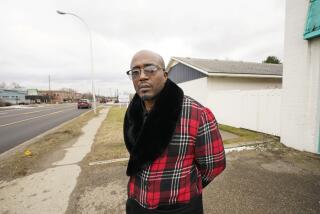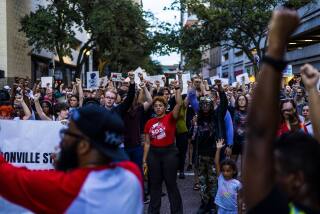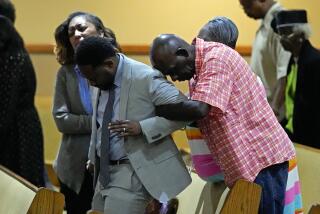Tension Between Police and Blacks Shakes Racial Tolerance in Toronto
- Share via
TORONTO — The minister at a suburban Toronto church was winding up his sermon one recent Sunday evening when a phalanx of police officers charged in and yanked four black youths and an East Indian teen-ager out of the pews.
While the stunned congregation at the Malvern Christian Assembly Church looked on, the officers, cursing loudly, hauled the youths out to the vestibule, handcuffed them and whisked them away.
A few hours later the four boys and a girl were released without being charged, and an embarrassed senior police official later said they had been mistaken for armed bandits who had robbed a flea market.
The incident was one of several recent occurrences that have alarmed black citizens in Toronto and have called into question the metropolitan area’s cultivated reputation for even-handed treatment of its diverse ethnic groups, as well as the professionalism of its police department. For years, city boosters claimed in promotions that “Our Cops Are Tops.”
By American standards, Toronto is a safe city. Women still feel comfortable walking alone on downtown streets late at night. Drugs, including crack, are sold here but street violence is rare.
Tough Gun Laws
Tough gun laws are strictly enforced. There were 53 murders last year in the entire metropolitan area of about 3.3 million people. That compares to Washington, a city of 622,000 people that had 372 murders last year.
In 1987 there were 235 armed robberies here, and a police spokeswoman said the number did not appear to increase substantially last year, although final tallies have not been compiled.
But there has been a rise in tension between police and members of Toronto’s loosely knit black community of about 140,000. Blacks have complained that police stop them more often than other ethnic groups and treat them with condescension. Police have complained that black activists have brought undue pressure on the city government to charge officers who have shot black suspects.
The belief by many blacks that they are singled out for discriminatory treatment intensified last summer when officers in a downtown station house distributed an advisory to merchants warning them to be on guard for suspicious activity by black customers who, the police said, were usually the perpetrators of after-hours burglaries.
Some spokesmen for the black community acknowledged that feelings of alienation among some black youths have contributed to the problem. Last summer there were several sprees after rock concerts in which blacks threw rocks into shop windows.
‘There’s a Lot of Poverty’
“It’s the usual social problem,” said Benjamin Radford, executive director of the Toronto Urban Alliance Against Racism, who is black. “There’s a lot of poverty. Black youth don’t seem to be as successful in schools as other groups. There’s a lot of unemployment. It seems like a black young person has a harder time making it.”
In the incident at the church, it turned out that a cab driver, who said he had brought a group to the church who resembled a police description of the robbers, had misidentified the five who were apprehended.
“We acted upon good faith,” said Douglas Bulloch, the suburb’s deputy police chief. “I don’t know what the heck more we can do.”
Howard Brown, a deacon at the integrated church, said the 14 officers who came would not explain their mission when they barged in. The police were “shoving and grabbing people and yelling foul language,” he said. “They totally disrupted the service. The kids were scared stiff.”
Another youth, a college student and avid churchgoer, refused to follow the officers out of church, Brown said, and they “charged the youth, full body punch and wham, he was lifted in the air and taken out. There was no need for that.”
‘Angry, Humiliated, Frustrated’
Dorothy Lucas, who was praying at the altar when her 13-year-old daughter and 14-year-old son were grabbed, told reporters later she was “angry, humiliated and frustrated that this could happen.”
In another incident Ontario authorities on Jan. 4 charged two white police officers involved in the fatal shooting last month of a 17-year-old black youth with manslaughter and aggravated assault.
The officers said they opened fire on a stolen car driven by the youth “in defense of their lives,” because the car was heading straight at them. The teen-ager’s family said doctors told them the bullet entered the back of his head. Television film showed that only the car’s rear window had been shot out.
On Jan. 11 Ontario authorities charged another metropolitan policeman with manslaughter after a five-month investigation into the death of a partially paralyzed 44-year-old black man who was shot once in the chest at point-blank range. The officer and a partner who accompanied him said the man had lunged at them with a knife.
Black activists criticized authorities for not bringing murder charges in both cases. Dari Meade, a member of the small Black Action Defense Committee, said blacks are tired of what he described as “Gestapo-like tactics” and warned that unless the situation improves, blacks are “going to start meeting force with force.”
Police, however, were livid about the manslaughter charges. They staged a work slowdown, and more than 400 officers in different parts of the city did not come to work.
Others reported for duty but parked in station-house lots and responded only to emergency calls. At one station house, officers went on patrol but refused to wear their guns.
Art Lymer, president of the Metropolitan Toronto Police Assn., told reporters that police believed the charges were brought only because of pressure from Toronto’s black community.
“If this city wants to be run by a very small group of black activists, then what you’re going to end up with is another Detroit,” he said. “If (blacks) provoke violence, violence is going to be provoked against them. And if they put somebody’s life in danger, their own life is going to be put in danger.”
Members of the police association voted unanimously to condemn the Ontario government for the manslaughter charges and demanded the resignation of provincial Atty. Gen. Ian Scott.
The officers also decided to lead a boycott of the Toronto Star, claiming that the newspaper’s coverage was anti-police. When reporters attempted to talk to police after the meeting, they were barred by officers who chanted, “No Star. No Star.”
More to Read
Sign up for Essential California
The most important California stories and recommendations in your inbox every morning.
You may occasionally receive promotional content from the Los Angeles Times.













